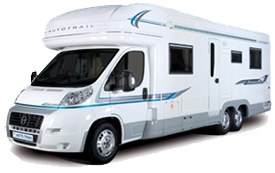Safety precautions: For RV’s Motor Homes and Caravans
 Here are 14 recommendations to reduce the risk of CO poisoning:
Here are 14 recommendations to reduce the risk of CO poisoning:
- The most important recommendation: USE A CARBON MONOXIDE WARNING DETECTOR. As is true of a smoke alarm, reliance on a CO detector is acceptable only if the device is in good working order and is tested periodically as directed by the manufacturer.
- Inspect your RV’s chassis and generator exhaust system regularly, at least before each outing and after bottoming out or any other incident that could cause damage.
- Inspect the RV for openings in the floor or sidewalls. If you locate a hole, seal it with a silicone adhesive or have it repaired before using your generator again.
- Inspect windows, door seals, and weather strips to ensure that they are sealing properly.
- Yellow flames in propane-burning appliances such as coach heaters, stoves, ovens, and water heaters usually indicate a lack of oxygen. Determine the cause of this condition and correct it immediately.
- If applicable, have your built-in vacuum cleaner checked to make sure it does not exhaust under the underside of your RV. Have the system changed if it does.
- Do not operate your generator if the exhaust system is damaged in any way or if an unusual noise is present.
- Park your RV so that the exhaust may easily dissipate away from the vehicle. Do not park next to high grass or weeds, snowbanks, buildings, or other obstructions that might prevent exhaust gases from dissipating as they should.
- Keep in mind that shifting winds may cause exhaust to blow away from the coach one moment and under the coach the next.
- When stopping for long periods of time, be aware of other vehicles around you, such as tractor-trailers at rest stops, that may have their engines and refrigerators running.
- Do not sleep with the generator operating.
- Leave a roof vent open anytime the generator is running, even during the winter.
- If you do not feel well, do not be fooled into thinking that it isbecause you have been driving too long, you ate too much, or you are suffering from motion sickness. Shut off the generator and step outside for some fresh air just to be sure.
- Consider parking in the “No Generator” zone that FMCA makes available at its conventions
Carbon Monoxide
Accidents which have occurred as a result of carbon monoxide poisoning or asphyxiation are caused by a combination of circumstances, usually involving two or more of the following factors:
- Inadequate ventilation (permanent air inlets)
- Unsatisfactory flueing
- Poor appliance performance
- User interference
- Lack of routine maintenance
Annual Servicing
All Gas appliances in your holiday home should be serviced annually to keep them in a safe and efficient condition (this is a legal requirement in certain circumstances, see sub-letting below). It is vital that appliances are properly services and maintained, however, while this will reduce the risk of CO leaks it will not eliminate all problems that occur between service dates.
The service should include:
- Ventilation check (air inlets are clear and adequate)
- Flue check (smoke spillage test)
- Appliance safety devices are working correctly
- Appliances are safe for further use
- A check for gas leaks and condition of pipework and hoses
Don’t Do It Yourself with Gas
By tampering with the gas installation/appliance you may put yourself and your family’s life at risk. Gas is very safe in the hands of an expert.
The message is clear:
If you, or your park, sub-let your Caravan holiday home you may be seen as a ‘landlord’ under the Gas Safety (Installation & Use) Regulations and thereby face other legal duties.
The Regulations place a legal duty on landlords to ensure all gas installations, including the appliances and their flues are maintained in a safe condition. In order to achieve this, the appliances and their flues must be safety checked at intervals of not more than 12 months.
In addition to keeping records of their checks for 2 years, landlords are also legally required to prominently display the gas safety inspection record within the caravan holiday home.


